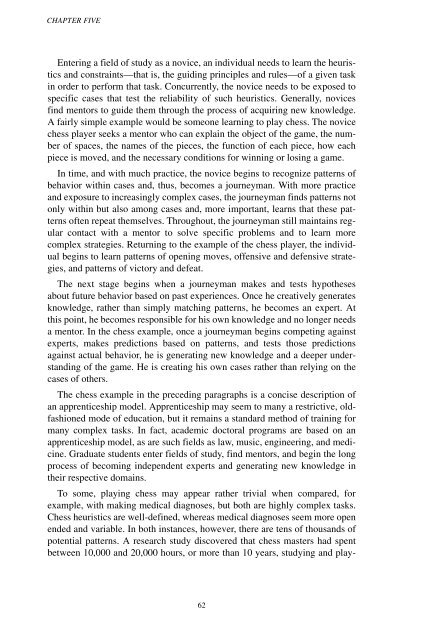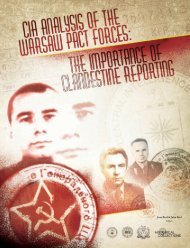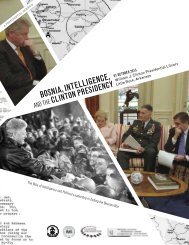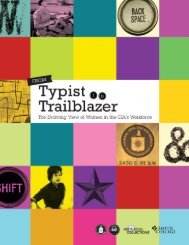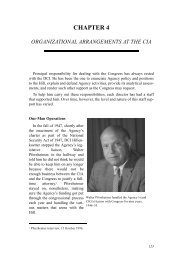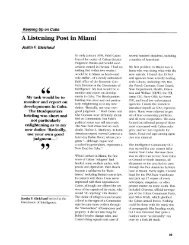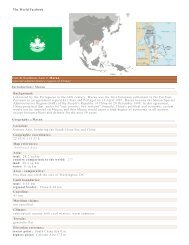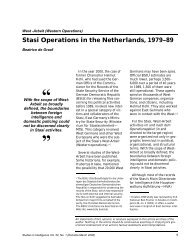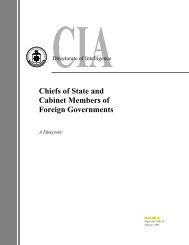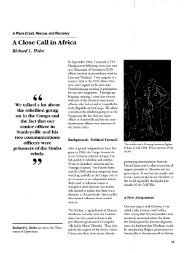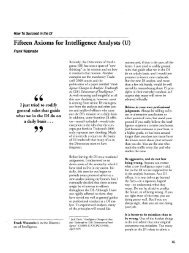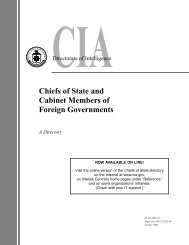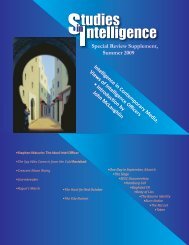Analytic Culture in the U.S. Intelligence Community (PDF) - CIA
Analytic Culture in the U.S. Intelligence Community (PDF) - CIA
Analytic Culture in the U.S. Intelligence Community (PDF) - CIA
You also want an ePaper? Increase the reach of your titles
YUMPU automatically turns print PDFs into web optimized ePapers that Google loves.
CHAPTER FIVE<br />
Enter<strong>in</strong>g a field of study as a novice, an <strong>in</strong>dividual needs to learn <strong>the</strong> heuristics<br />
and constra<strong>in</strong>ts—that is, <strong>the</strong> guid<strong>in</strong>g pr<strong>in</strong>ciples and rules—of a given task<br />
<strong>in</strong> order to perform that task. Concurrently, <strong>the</strong> novice needs to be exposed to<br />
specific cases that test <strong>the</strong> reliability of such heuristics. Generally, novices<br />
f<strong>in</strong>d mentors to guide <strong>the</strong>m through <strong>the</strong> process of acquir<strong>in</strong>g new knowledge.<br />
A fairly simple example would be someone learn<strong>in</strong>g to play chess. The novice<br />
chess player seeks a mentor who can expla<strong>in</strong> <strong>the</strong> object of <strong>the</strong> game, <strong>the</strong> number<br />
of spaces, <strong>the</strong> names of <strong>the</strong> pieces, <strong>the</strong> function of each piece, how each<br />
piece is moved, and <strong>the</strong> necessary conditions for w<strong>in</strong>n<strong>in</strong>g or los<strong>in</strong>g a game.<br />
In time, and with much practice, <strong>the</strong> novice beg<strong>in</strong>s to recognize patterns of<br />
behavior with<strong>in</strong> cases and, thus, becomes a journeyman. With more practice<br />
and exposure to <strong>in</strong>creas<strong>in</strong>gly complex cases, <strong>the</strong> journeyman f<strong>in</strong>ds patterns not<br />
only with<strong>in</strong> but also among cases and, more important, learns that <strong>the</strong>se patterns<br />
often repeat <strong>the</strong>mselves. Throughout, <strong>the</strong> journeyman still ma<strong>in</strong>ta<strong>in</strong>s regular<br />
contact with a mentor to solve specific problems and to learn more<br />
complex strategies. Return<strong>in</strong>g to <strong>the</strong> example of <strong>the</strong> chess player, <strong>the</strong> <strong>in</strong>dividual<br />
beg<strong>in</strong>s to learn patterns of open<strong>in</strong>g moves, offensive and defensive strategies,<br />
and patterns of victory and defeat.<br />
The next stage beg<strong>in</strong>s when a journeyman makes and tests hypo<strong>the</strong>ses<br />
about future behavior based on past experiences. Once he creatively generates<br />
knowledge, ra<strong>the</strong>r than simply match<strong>in</strong>g patterns, he becomes an expert. At<br />
this po<strong>in</strong>t, he becomes responsible for his own knowledge and no longer needs<br />
a mentor. In <strong>the</strong> chess example, once a journeyman beg<strong>in</strong>s compet<strong>in</strong>g aga<strong>in</strong>st<br />
experts, makes predictions based on patterns, and tests those predictions<br />
aga<strong>in</strong>st actual behavior, he is generat<strong>in</strong>g new knowledge and a deeper understand<strong>in</strong>g<br />
of <strong>the</strong> game. He is creat<strong>in</strong>g his own cases ra<strong>the</strong>r than rely<strong>in</strong>g on <strong>the</strong><br />
cases of o<strong>the</strong>rs.<br />
The chess example <strong>in</strong> <strong>the</strong> preced<strong>in</strong>g paragraphs is a concise description of<br />
an apprenticeship model. Apprenticeship may seem to many a restrictive, oldfashioned<br />
mode of education, but it rema<strong>in</strong>s a standard method of tra<strong>in</strong><strong>in</strong>g for<br />
many complex tasks. In fact, academic doctoral programs are based on an<br />
apprenticeship model, as are such fields as law, music, eng<strong>in</strong>eer<strong>in</strong>g, and medic<strong>in</strong>e.<br />
Graduate students enter fields of study, f<strong>in</strong>d mentors, and beg<strong>in</strong> <strong>the</strong> long<br />
process of becom<strong>in</strong>g <strong>in</strong>dependent experts and generat<strong>in</strong>g new knowledge <strong>in</strong><br />
<strong>the</strong>ir respective doma<strong>in</strong>s.<br />
To some, play<strong>in</strong>g chess may appear ra<strong>the</strong>r trivial when compared, for<br />
example, with mak<strong>in</strong>g medical diagnoses, but both are highly complex tasks.<br />
Chess heuristics are well-def<strong>in</strong>ed, whereas medical diagnoses seem more open<br />
ended and variable. In both <strong>in</strong>stances, however, <strong>the</strong>re are tens of thousands of<br />
potential patterns. A research study discovered that chess masters had spent<br />
between 10,000 and 20,000 hours, or more than 10 years, study<strong>in</strong>g and play-<br />
62


